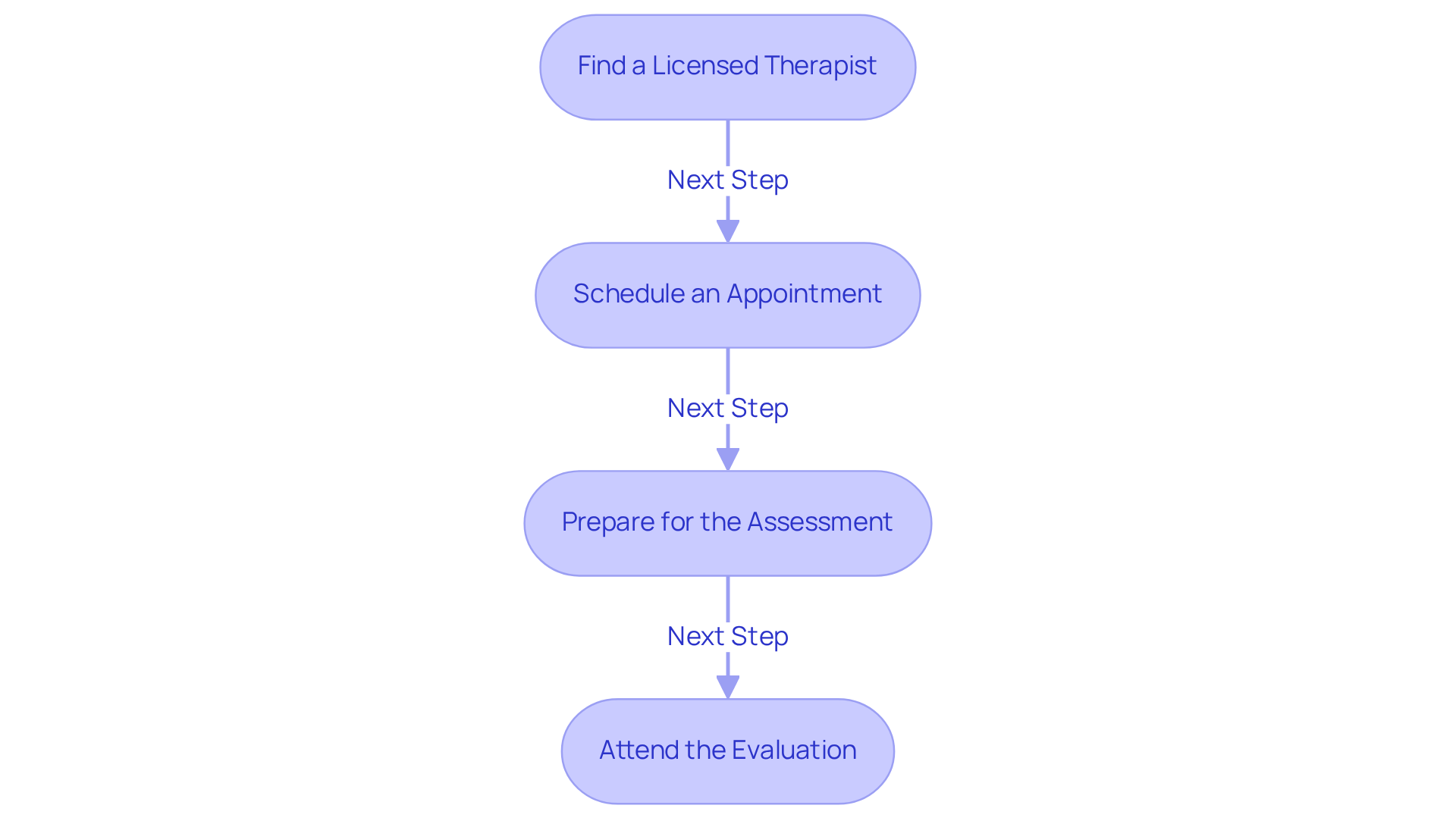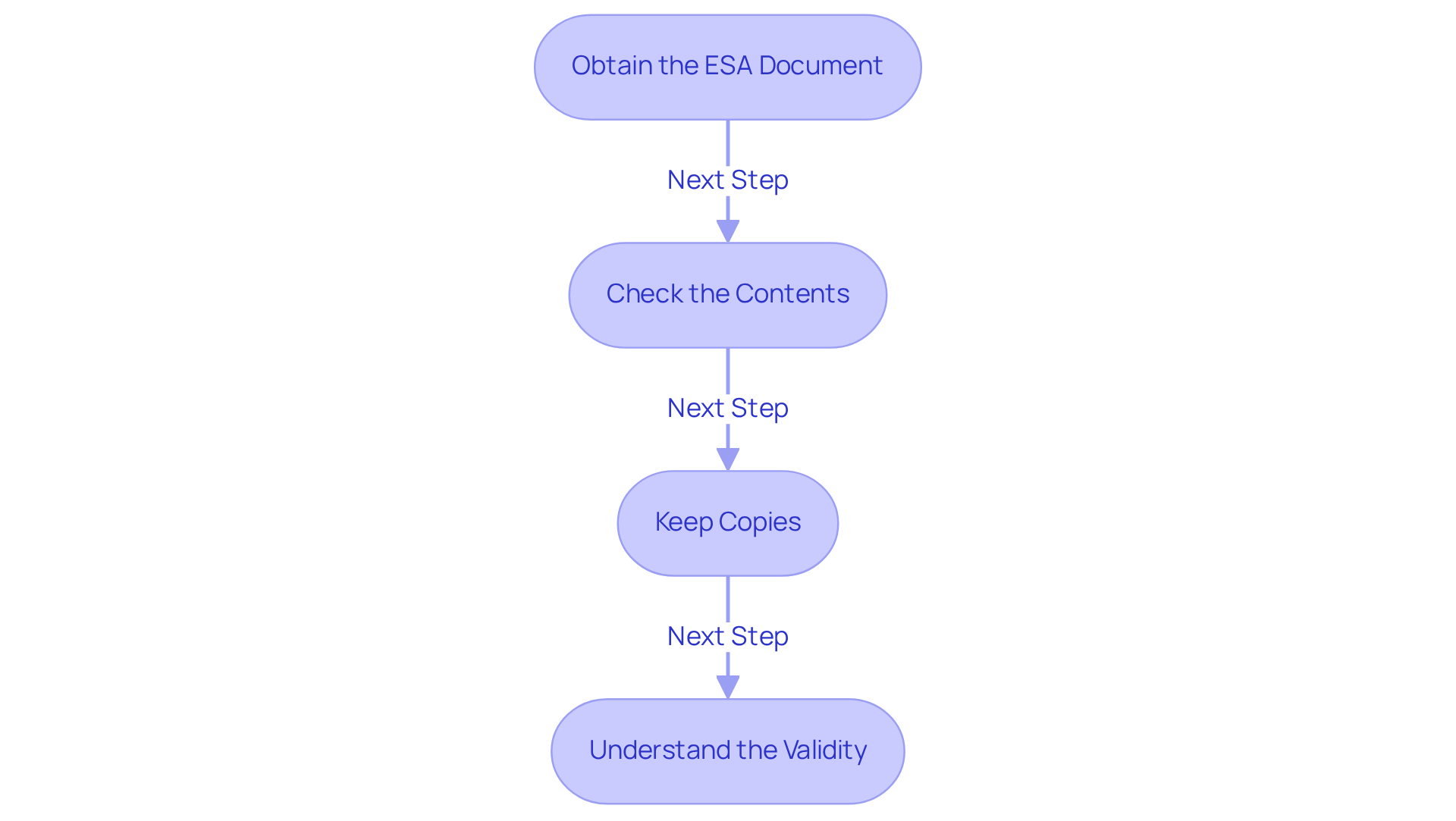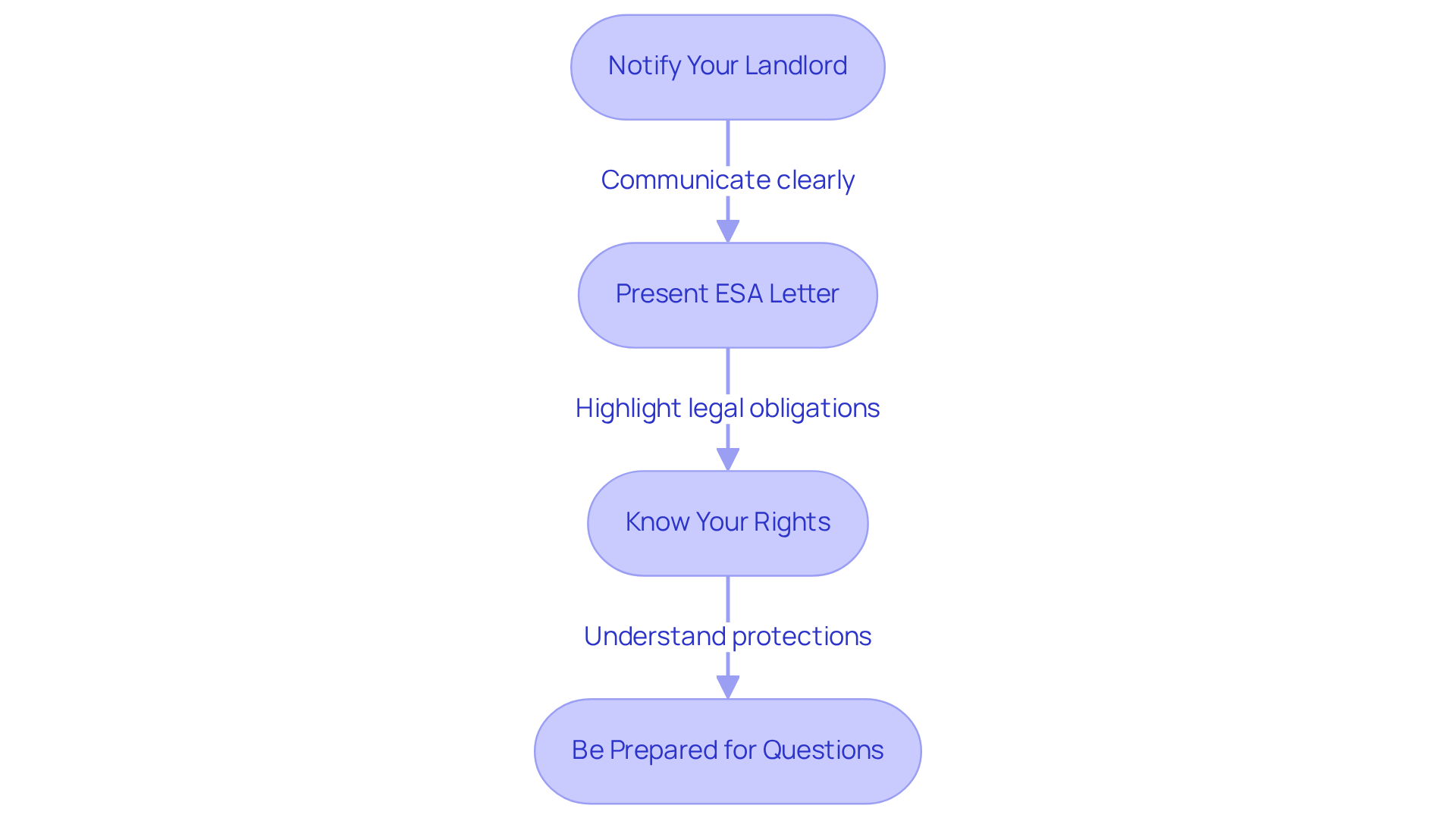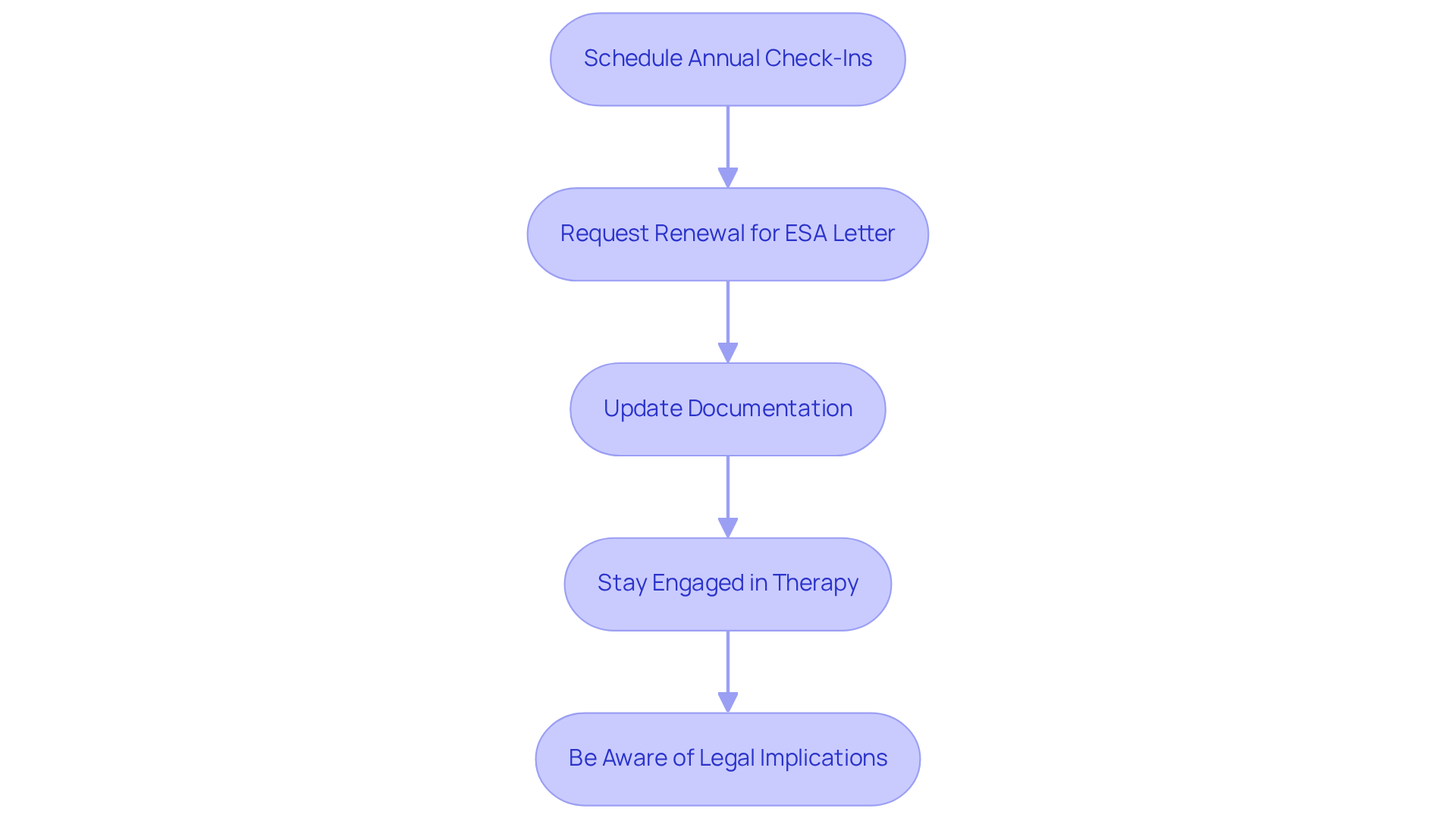

How to Obtain an ESA Letter for Your Apartment in 4 Steps
by Lena Park
Last updated: September 19, 2025
Verified and Approved by:
Angela Morris,
MSW, LCSW
Fact Checked

Overview
Obtaining an ESA letter for your apartment can feel overwhelming, but it’s a journey that can lead to much-needed support. Start by consulting a licensed therapist who can help you assess your mental health needs. This step is crucial, as it allows you to explore your emotional challenges and understand how an ESA can provide comfort and companionship.
Once you’ve connected with a therapist, you’ll receive the official ESA document. This letter is not just a piece of paper; it’s a testament to your needs and rights under the Fair Housing Act. Presenting this letter to your landlord is an important step in ensuring that your living environment supports your emotional well-being.
Remember, this process doesn’t end with just obtaining the letter. It’s essential to renew it annually and maintain ongoing communication with your therapist. This continuous support can help you navigate your mental health journey, ensuring that you feel understood and cared for.
Having an ESA can significantly enhance your quality of life, offering emotional support during tough times. You are not alone in this; many individuals face similar struggles, and there are compassionate solutions available to help you thrive. Take this step towards emotional well-being, and know that support is always within reach.
Introduction
Navigating the complexities of securing an emotional support animal (ESA) letter for housing can feel overwhelming. As mental health awareness grows, so does the demand for such accommodations, making the process even more daunting. This guide aims to simplify the journey into four clear steps, empowering you to obtain the necessary documentation with confidence.
However, what happens when landlords are unaware of their obligations? Or when the intricacies of ESA regulations create barriers? Understanding these challenges is crucial for anyone looking to ensure their right to live with their emotional support companion.
It’s important to remember that you are not alone in this struggle, and support is available to help you through.
Consult a Licensed Therapist to Assess Eligibility
-
Find a Licensed Therapist: Begin your journey by seeking a licensed mental health professional who specializes in emotional support animals (ESAs). Platforms like Wellness Wag can be a valuable resource in connecting you with therapists who genuinely understand the nuances of ESA therapy and are ready to support you.
-
Schedule an Appointment: Once you’ve found a suitable therapist, take the next step by arranging an appointment for an evaluation. It’s important to choose someone who is not only skilled in ESAs but also knowledgeable about the legal requirements for issuing an esa letter for apartment. This ensures that you are in compliance with the regulations that vary by state and housing authority, giving you peace of mind.
-
Prepare for the Assessment: Before your appointment, take a moment to reflect on your mental health challenges and consider how an ESA might offer you support. Think about your symptoms, previous treatments, and the specific ways an ESA could enhance your well-being. This preparation can help you articulate your needs during the evaluation.
-
Attend the Evaluation: During the evaluation, your therapist will assess your mental health and discuss your need for an esa letter for apartment. Being honest and open about your emotions and experiences is vital, as it allows the therapist to provide a well-informed recommendation regarding your qualification for an ESA. This collaborative process not only builds trust but also acknowledges the growing recognition of the therapeutic benefits that animal companionship can bring to your life.

Receive Your Official ESA Letter with Required Documentation
-
Obtain the ESA Document: After your assessment, if the therapist determines that you are eligible for an emotional support animal (ESA), they will provide you with an official ESA document. This document should be printed on the therapist’s stationery and include their contact information, license number, and signature, ensuring it is official and credible.
-
Check the Contents: It’s essential to ensure that the document clearly states your need for an emotional support companion due to your mental health condition. It should also specify that the animal provides therapeutic benefits, reinforcing its vital role in your treatment plan.
-
Keep Copies: Make several copies of your ESA document. You will likely need to present the ESA letter for apartment to your landlord and possibly other entities, such as airlines, so having extra copies is beneficial. When traveling with your ESA, remember that you must complete the U.S. DOT Service Animal Air Transportation Form, which requires vaccination details and certification of your animal’s training in specific assistive functions. If your flight lasts eight hours or longer, you will also need to fill out the U.S. DOT’s Service Animal Relief Attestation Form, ensuring your travel experience is smooth and supported.
-
Understand the Validity: Be aware that ESA documents are only valid for one year from the date they are issued. It is advisable to renew them annually to ensure they remain valid and accurately reflect your current mental health status. This is particularly important if you plan to submit the ESA letter for apartment to a landlord more than a year after you first obtained it. The Fair Housing Act protects individuals with a legitimate ESA letter for apartment from discrimination, allowing them to live with their ESAs in accommodations that typically prohibit pets. With 25% of Americans facing an emotional or mental disability annually, maintaining a current ESA document is crucial for those who rely on the companionship of their pets.

Present Your ESA Letter to Landlords and Understand Your Rights
-
Notify Your Landlord: Once you have your ESA document in hand, it’s important to reach out to your landlord about your emotional assistance pet. Choose the method of communication—whether it’s an email or a face-to-face conversation—based on your relationship with them. This step is crucial, so ensure that your message is clear and professional.
-
When you present the ESA letter for your apartment, make sure to provide a clear copy. It’s essential to highlight that, under the Fair Housing Act, landlords are legally obligated to accommodate your emotional assistance creature with an ESA letter for your apartment, even if their property has a no-pet policy. This legal support is vital in your conversation, reinforcing your rights.
-
Know Your Rights: Understanding your rights as an ESA owner is incredibly important. Remember, landlords cannot impose pet fees or deposits for emotional assistance creatures, nor can they deny your request without valid, documented reasons. Familiarizing yourself with these protections empowers you to advocate effectively for your needs.
-
Be Prepared for Questions: It’s natural to expect that landlords may have questions about your ESA. Be ready to explain how your pet contributes to your mental health journey. However, it’s equally important to remember that you are not obligated to disclose specific medical details. You can maintain your privacy while still providing the necessary context to support your request.

Renew Your ESA Letter Annually and Maintain Communication with Your Therapist
-
Schedule Annual Check-Ins: At least once a year, it’s important to arrange a follow-up appointment with your therapist. This time allows you to assess your mental health and discuss how your emotional assistance animal (ESA) relates to your ESA letter for apartment and continues to support you. These routine check-ins are essential for evaluating your needs and ensuring that your ESA letter for apartment provides the necessary assistance.
-
Request a renewal for your ESA letter for apartment: If your therapist confirms that you still need an ESA, begin the renewal process for your ESA letter for apartment documentation at least 30 days before it expires. This typically involves a brief assessment to validate your ongoing need for emotional support, which is crucial for maintaining your housing rights and travel privileges. If you plan to travel with your ESA, make sure your updated documentation meets Air Canada’s requirements, including the U.S. DOT Service Animal Air Transportation Form, which certifies your ESA’s training and behavior.
-
Update Documentation: Ensure that your renewed ESA document contains current information and is duly signed by your therapist. An updated ESA letter for apartment is vital for compliance with housing regulations and for facilitating travel with your ESA, as landlords and airlines often require current documentation. Remember to keep both digital and physical versions of the updated document for easy access. If your flight lasts eight hours or longer, be prepared to complete the U.S. DOT’s Service Animal Relief Attestation Form as well.
-
Stay Engaged in Therapy: Continuing to attend therapy sessions as needed is important. Regular engagement not only strengthens your mental health but also fosters a deeper relationship with your therapist. This ongoing interaction is beneficial for obtaining future ESA letter for apartment documentation and addressing any adjustments in your emotional support needs. Moreover, it’s crucial to remember that failing to renew your ESA letter for apartment can lead to legal implications, such as losing housing rights or facing additional pet fees, which may include eviction or increased costs associated with unauthorized pets.

Conclusion
Obtaining an emotional support animal (ESA) letter for your apartment can feel overwhelming, especially when navigating the complexities of mental health. It’s important to recognize the emotional challenges you may face during this process. However, by following the structured steps outlined, you can ensure that you have the necessary documentation and support to live harmoniously with your emotional support animal, ultimately enhancing your mental well-being.
- Consulting a licensed therapist for an assessment is a vital first step. This professional guidance not only helps in obtaining an official ESA letter that meets all documentation requirements but also reinforces your understanding of your rights.
- Your landlord is obligated under the Fair Housing Act to accommodate your needs, and being informed about this can alleviate some of the stress.
- Remember, renewing your ESA letter annually is essential to maintain these rights, ensuring that you remain supported throughout your journey.
In a world where mental health challenges are increasingly recognized, the role of emotional support animals cannot be overstated. They provide companionship and contribute significantly to the therapeutic process, offering comfort during difficult times. For those of you seeking to navigate the complexities of obtaining and maintaining an ESA letter, staying informed and proactive is key. Engaging with mental health professionals and understanding your legal rights empowers you to advocate for yourself, ensuring that your emotional support needs are met.
You are not alone in this journey. Many individuals find strength and solace through their emotional support animals, and by taking these steps, you are prioritizing your mental health and well-being. Remember, support is available, and you deserve to have your emotional needs acknowledged and met.
Frequently Asked Questions
How do I start the process of getting an emotional support animal (ESA)?
Begin by seeking a licensed mental health professional who specializes in emotional support animals. Platforms like Wellness Wag can help connect you with therapists experienced in ESA therapy.
What should I do after finding a therapist?
Schedule an appointment for an evaluation. It is important to choose a therapist knowledgeable about the legal requirements for issuing an ESA letter for housing to ensure compliance with state and housing authority regulations.
How can I prepare for my assessment with the therapist?
Reflect on your mental health challenges and consider how an ESA might support you. Think about your symptoms, previous treatments, and how an ESA could enhance your well-being to help articulate your needs during the evaluation.
What happens during the evaluation with the therapist?
The therapist will assess your mental health and discuss your need for an ESA letter. Being honest and open about your emotions and experiences is crucial for the therapist to provide a well-informed recommendation regarding your qualification for an ESA.
Why is it important to be honest during the evaluation?
Honesty allows the therapist to understand your situation fully and make an informed recommendation about your need for an ESA. This collaborative process builds trust and acknowledges the therapeutic benefits of animal companionship.
Certify Your Emotional Support Animal Today

Why You Can Rely on Us?
At Wellness Wag, we believe your pet deserves care rooted in both science and compassion. Each article is carefully researched, written in clear language for pet owners, and then reviewed by qualified professionals to ensure the information is evidence-based, current, and practical for real-life care. Our goal is to help you feel confident in making informed decisions about your pet’s health and well-being.
Reviewed by
Angela Morris, MSW, LCSW
Angela is a licensed clinical social worker with 20 years of experience in patient advocacy and community mental health. She has assisted numerous clients with ESA evaluations and brings a deep understanding of disability accommodations, ensuring that all information is accurate, supportive, and practical.

Written by :
Lena Park
Last Updated :
September 19, 2025












